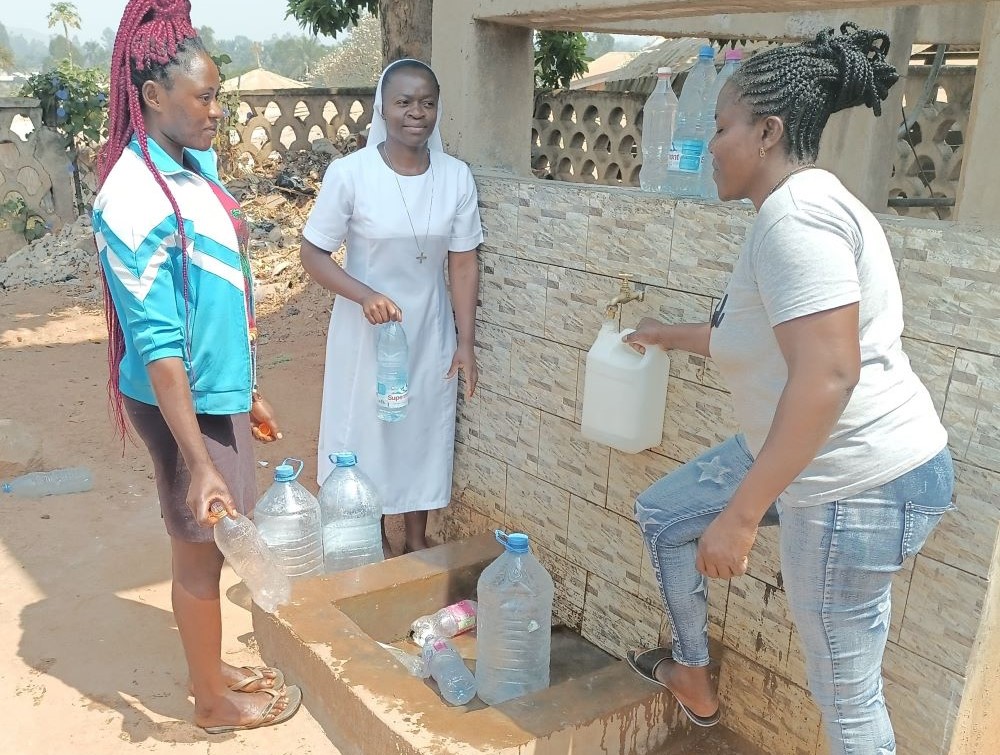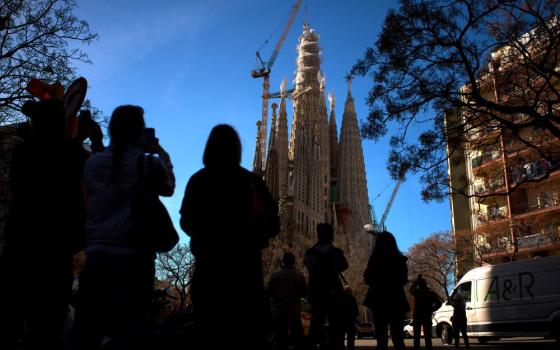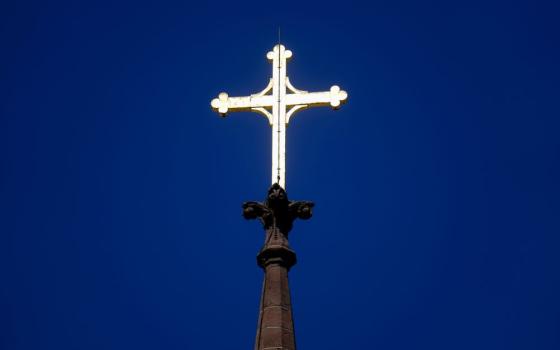
Sr. Kum Shallotte (center), motivated by the need for clean water in the Northwest Region of Cameroon, advocated for and secured a solar-powered borehole for her community. (Courtesy of Kum Shallotte)
In 2021, as the head of a health facility in the heart of a conflict-affected area of the Northwest region of Cameroon, I witnessed firsthand the challenges that arose from limited resources and ongoing insecurity. Among the most pressing issues was the lack of access to clean water — a problem that jeopardized the health of our patients and the surrounding community.
This fundamental need impelled me to embark on a journey to bring clean water to the health center and the surrounding neighborhood.
The idea of providing a borehole (a drilled water well) seemed like a distant dream. Given that funding was scarce, especially in the conflict-affected area, where was I to begin? Still, I could not let go of the vision. I was inspired to speak out for the community, as I said to myself that it is better to say it and let nothing be done rather than watch the situation and do nothing about it. I began to reach out. First, I shared about the situation with another sister in my community, and she encouraged me to present it to our local leadership team.
What could be more sacred than giving a gift of water to the thirsty?
The health center had a well in place that served both its needs and the needs of the local neighborhood. But lack of water in the dry season compromised certain hygienic practices in the health center like hand washing — a simple yet essential act for preventing infections. In the community, the situation was equally dire as women and children fetched water from unsafe sources. This led to an increase in the number of water-borne infections in the community as reflected in the health center records.
When I informed our local leadership team of the situation, they asked me to write to the Access to Clean Water committee at the level of the generalate. From there I was asked to develop a project detailing the needs of the community and the potential impact of the project, working in collaboration with some leaders from the community and other sisters to develop the project.
My conversations with the committee at the level of our general leadership team ended on a positive note. They secured and granted funds for the drilling of the borehole. When I received the news, I was overwhelmed with joy and filled with positive energy, and so was everyone in the community. All other arrangements were made to begin according to the timeline. Hydrogeological studies were done and the spot with the most abundant source of water that could take us round the year was identified. The work finally began, though with some challenges related to the prevailing crisis. Finally, the borehole was drilled and powered by solar.
I will never forget the day the borehole was completed; this day was marked by excitement, great joy, celebration and even disbelief for some.
In the months that followed, the transformation was evident. At the level of the health facility, there was improved hygiene and sanitation. Cases of water-borne diseases dropped. Outside the health center, the borehole became a source of life for the entire neighborhood; women and children no longer had to make long and dangerous journeys to fetch water. To express their gratitude, some leaders of the community decided to maintain the tap supplying the neighborhood each time there is a breakdown.
As much as this project changed the community, it changed me more. This experience deepened my faith as I often found myself praying for guidance and strength in face of uncertainty. The borehole became for me and the community not only a practical solution but also a testimony of the power of hope.
Advertisement
As mentioned earlier, this project was not without challenges, including a delay in starting the project due to multiple lockdowns. By the time we started the project, the cost of materials had increased from what we initially budgeted for, leaving us with insufficient funds. But thanks to the support and collaboration of the community, the access to clean water committee, and other stakeholders, through constant communication and adaptation to the changes, we successfully navigated through the challenges.
This project taught me invaluable lessons about leadership, resilience and the power of collaboration. First, true change is possible when communities are actively involved in the solutions to the problems that affect their lives. Secondly, advocacy is a powerful tool. By raising our voices and sharing our stories, we can draw attention to critical issues and mobilize resources to address them. Finally, this experience reinforced my belief that no challenge is insurmountable when people come together with a shared vision.
As I reflect on this experience, I feel a renewed sense of purpose. My work is far from over; I carry with me lessons, relationships, moments of grace that this project brought to my life. Clean water is not a luxury; it is a lifeline, a gift, we must strive to share with all. Many communities in rural Cameroon and beyond continue to struggle without access to clean water. I invite others to join in this journey whether through advocacy, support or simply raising awareness. We all have a role to play in bringing hope and health to the places that need it most.
In the end, what could be more sacred than giving a gift of water to the thirsty?




